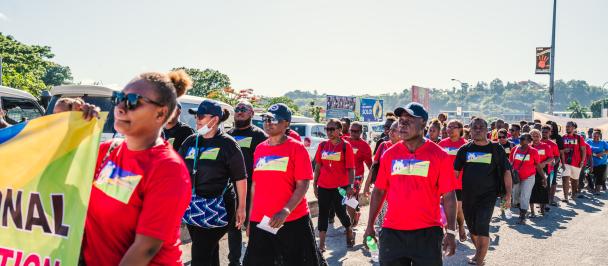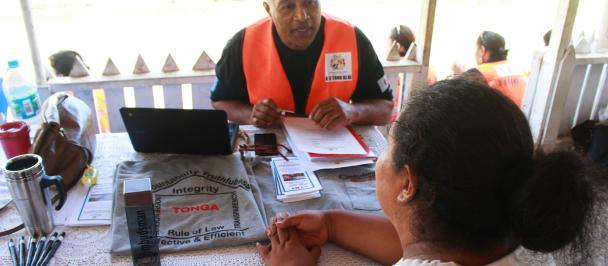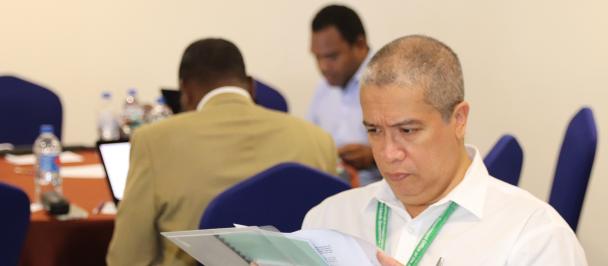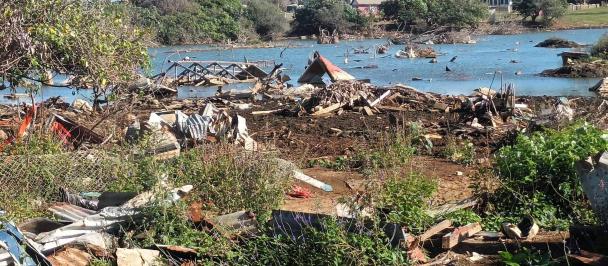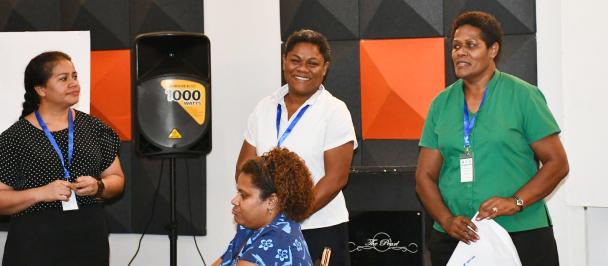A week of Right to Information dialogue and advocacy in Tonga
January 27, 2023
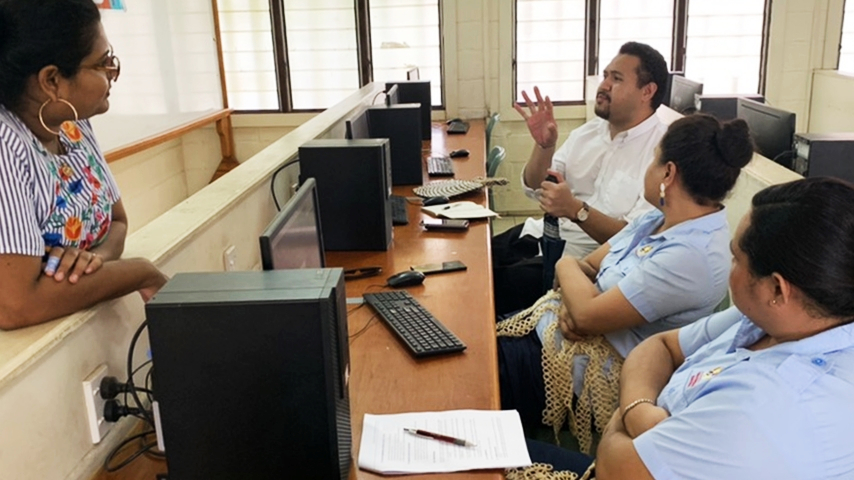
Students in Tonga actively engaged in discussion on right to information during the workshop facilitated by the USP STEMP.
Nukuʻalofa, Tonga – Government and public institutions, civil society organizations (CSOs), business community and youth in Tonga came together to discuss and promote the right to information (RTI) as a critical tool to improve transparency and accountability in the public sector and reduce corruption.
A series of dialogues and advocacy events to scale up and innovate towards advancement of RTI and anti-corruption in the Pacific was conducted from 17 – 20 January by University of the South Pacific (USP) School of Information Technology, Engineering, Mathematics and Physics (STEMP) and USP Students’ Association (USPSA) in partnership with UN Development Programme (UNDP), supported by the Governments of the United Kingdom and New Zealand.
The engagement aimed to promote and extend RTI both as an anti-corruption tool and as an important element of participatory governance. A week of activities included workshops with students and inclusive dialogue with public and private sectors, civil society, and youth.
The RTI dialogue sessions were officially opened by the Chief Executive Officer of the Ministry of Meteorology, Energy, Information, Disaster Management, Environment, Climate Change and Communications, Mr Paula Ma'u, who welcomed the strong engagement in promoting RTI in Tonga.
In his remarks, he said that at the regional level, in the Pacific, freedom of information has been recognized as a key milestone to good governance.
“In Tonga, the Honourable Prime Minister recently announced Tongan Government’s intention to set up an anti-corruption commissioner and their office, which is a good sign to successfully implementing the freedom of information policy as we already have the draft legislation to this effect,” said Mr Ma'u.
The application of human-centered design approach to the RTI dialogue will inform further innovation and development of needs-based solutions by USP STEMP in partnership with UNDP. While using best global RTI practices, USP will tailor the methodology and the subsequent solutions to the Pacific context.
USP Vice Chancellor, Dr. Pal Ahluwalia, was appreciative for the partnerships that made progress in this field. “We at the University remain aspirational, energetic and committed to positive social change, providing cutting-edge academic knowledge and methodology to be applied in the society,” he said.
Prof. Ahluwalia acknowledged and commended the efforts of Dr. Bibhya Sharma and his team who continue to play a leading role for RTI awareness through their USP STEMP activities in the Pacific.
Young people have been a visible and vocal part of RTI advocacy in Tonga and the Pacific. They demonstrated their engagement in promoting anti-corruption as presented in the Pacific Youth Vision for a Corruption-Resilient 2050 Blue Pacific adopted at the 2022 Pacific Youth Summit, which was coordinated by USPSA and UNDP and recognized and welcomed by the Pacific Islands Forum leadership. The youth engagement is grounded on international and regional anti-corruption commitments including the 2021 Teieniwa Pacific Unity against Corruption Vision, and the 2050 Strategy for the Blue Pacific Continent.
USPSA Tonga President, Ms Tepola Lolohea speaking on behalf of the USPSA Secretary General, promoted the first ever Pacific Youth Vision for a Corruption-Resilient 2050 Blue Pacific and said, “I and thousands of youths look forward to the progress on the Youth Vision and I would like to use this opportunity to implore you all to support us, continue supporting our journey for good governance, the rule of law, minimal corruption, and the transparent treatment and sharing of information, which are all vital to building the requisite political will, and wider public confidence to advance the strategy, and ultimately achieve our vision.”
As part of UNDP’s regional anti-corruption work, which extends across 14 Pacific Island Countries including Tonga, the whole-of-society approach has been strengthened through the project, Strengthening Anti-corruption, Transparency and Accountability in Pacific Island Countries (Pacific Anti-Corruption Project) funded by the Government of the United Kingdom, and the United
Nations Pacific Regional Anti-Corruption Project (UN-PRAC) funded by the Government of New Zealand.
British High Commissioner to Tonga, Her Excellency Ms Lucy Joyce, said, “UK High Commission is pleased to have co-funded this means of opening up more channels of communication between the government and the public because while information may be available it is not always easily accessible. The RTI tool such as the one being developed through the USP RTI workshop will enhance participation and engagement of citizens with the government and encourage more inclusive and responsive approaches to economic development.”
Another recent progress in the RTI made in Tonga includes the new digital system to promote public access to information and public reporting through the revamped website of the Ombudsman Tonga supported by the Government of New Zealand through UNDP’s UN-PRAC project.
New Zealand’s Deputy High Commissioner to Tonga, Mr Peter Lund, said, “I congratulate the Tonga Ombudsman Office for its long-term efforts to boost transparency, accountability and open government, and for the useful and valuable new systems. Working through UNDP, the Government of New Zealand is pleased to support the initiative in Tonga and across the Pacific aimed at improving the RTI, tackling corruption, and delivering good governance for the benefit of all.”
UNDP Pacific Office in Fiji Deputy Resident Representative and Officer-in-Charge, Ms Yemesrach Workie, in her remarks said, “Corruption remains a complex and persistent challenge, and I am thankful for the willingness of and action taken by different sectors and partners to contribute to the RTI knowledge, advocacy, and development of innovative tools coordinated by the USP STEMP to serve the citizens’ interests.”
Mr. Vineet Singh on behalf of the USP RTI team, shared an overview and progress update made through the USP’s RTI initiative. He highlighted the applications of human-cantered design methodology for the different RTI workshops and stakeholder dialogues held in Tonga. He said, "We are showing the benefits of RTI and the tools which we are developing. We are receiving positive and useful feedback from the students and the stakeholders which we will address in our future development".
A Week of RTI Dialogue & Advocacy in Tonga was successful with active engagement of all participating organisations and high-level commitment to the advancement of RTI advocacy in the Pacific. The success was made possible thanks to the tremendous efforts made by Dr. Sharma, Dr. Robin Havea, the USP Laucala and Tonga RTI staff, including Mr. Vineet Singh and Ms. Pritika Reddy in organising and hosting the events.
The RTI is central to the foundational human right to freedom of expression, as recognized in the 1948 Universal Declaration of Human Rights, and the 1966 International Covenant on Civil and Political Rights. The Right to Information is also specifically referred to in the UN Convention against Corruption, the only legally binding multilateral international anti-corruption treaty, to which Tonga is a party since February 2020 among other 188 state parties (as of 18 November 2021).
For media interviews, please contact:
Dr. Bibhya Sharma, USP RTI Coordinator; USP STEMP | Email: bibhya.sharma@usp.ac.fj | Phone: +679 32069
Tomoko Kashiwazaki, Communications and Advocacy; UNDP Pacific Office in Fiji | Email: tomoko.kashiwazaki@undp.org | Phone: +679 331 2500

 Locations
Locations